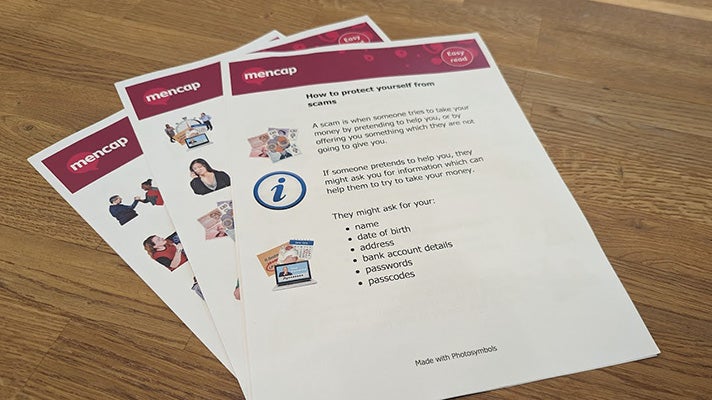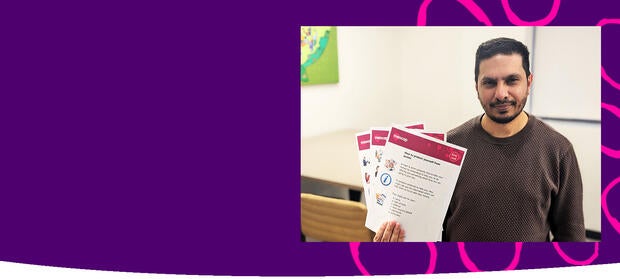Scams are scary. The idea of trusting the wrong person and losing control of your accounts, or having money stolen from you is something a lot of people worry about. That’s why I’ve been working with the Take Five
campaign
 A campaign is when people work together to try to change something.
to make easy reads about what a scam is and what you can do to protect yourself.
A campaign is when people work together to try to change something.
to make easy reads about what a scam is and what you can do to protect yourself.
I was almost scammed once - it wasn’t a nice experience. Somebody called me saying they were from a company that fixes computers and said there was something wrong with my one. They sounded really professional and were asking me all kinds of things, but it didn’t feel right. It was scary being asked lots of questions about my computer that I didn’t really understand.
I tried to stay calm, and just said that I will need to think about everything that he was saying and come back to him. I called up one of my colleagues who works in the IT department and told him what was happening. He straight away said to me it was a scam. “Whatever you do,” he told me, “don’t give them any information they’re asking you for.”
Luckily that day, I had an expert I could call and that stopped anything happening to me. But there are so many different ways that scammers try to trick you, it’s important to make sure you know what to do if you are being scammed or think you have been scammed.
Our new easy read guides have been made in partnership with Take Five, a national campaign that is raising awareness of the tricks scammers use and gives advice on what you can do to keep yourself safe from them. The new guides are to help people with a
learning disability
 A learning disability is to do with the way someone's brain works. It makes it harder for someone to learn, understand or do things.
, but they have good advice that anyone can use. You can read them and download them from our website now.
A learning disability is to do with the way someone's brain works. It makes it harder for someone to learn, understand or do things.
, but they have good advice that anyone can use. You can read them and download them from our website now.

The new easy read guide Ismail worked on with Take Five
The Take Five website has lots of good advice as well, people should look at it to learn more about different types of scams. There are three things Take Five say you should do when it comes to scams:
- Stop! Don’t pay any money or give any information straight away to someone. Give yourself some time and don’t let anyone make you feel rushed into something.
- Think! Ask yourself “Is this real or is this a scam?” Or ask someone you trust what they think about it. If you have any doubts, you can take your time and ask someone. If it is real then whoever is calling you will let you have the time to ask questions and check things so you are sure.
- Get Help! – If you think you have given information or money to someone as part of a scam, call your bank as soon as you can on a number you trust. You can find a safe number on your bank card or on your banks
website
 A website is a page you can go to on the internet like Google or YouTube.
.
A website is a page you can go to on the internet like Google or YouTube.
.
I think to myself sometimes, “How can people be like this? What makes them think it’s OK to trick people into giving them money?” It’s terrible, it’s just the same as stealing someone’s property or their belongings in person. So I hope by raising awareness and sharing our new easy reads we can help more people avoid falling for scams.


 Ismail Kaji
Ismail Kaji